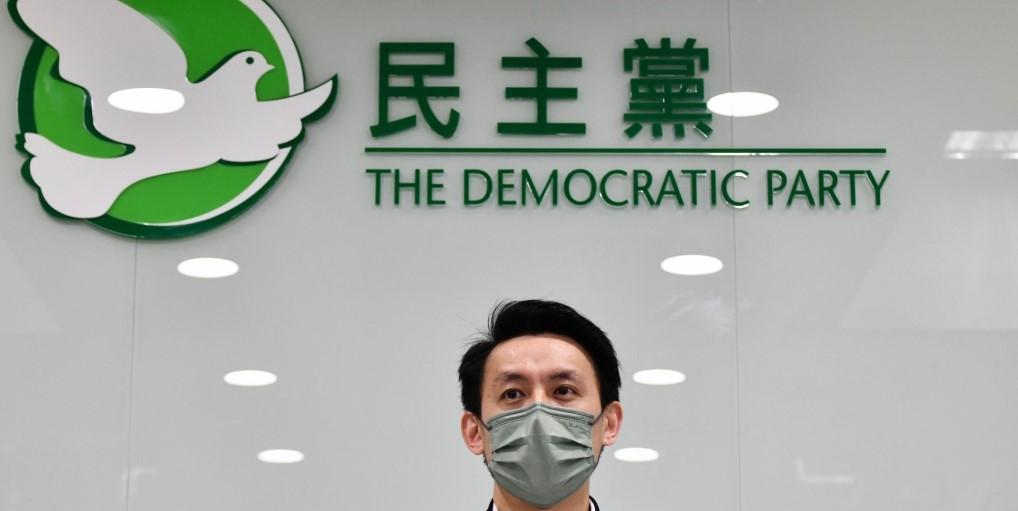Author: Lingde Studio, Kevin Chen
The question of whether the Democratic Party will run for election has become a hot topic again a few days ago. Lu Wenduan, vice chairman of the All-China Federation of Returned Overseas Chinese, wrote an article earlier, claiming that the way for the Democratic Party to live lies in: To eliminate the idea of "rejecting China and opposing China" from the ideological level, or the entire party will run for election normally as in the past, or allow individuals to run as members of the Democratic Party. Later, chief executive Carrie Lam Cheng Yuet-ngor said in an interview that if a political group does not participate in the administration and discussion of politics, it will make people question its existence value.

The question of whether the Democratic Party will run for election has become a hot topic again a few days ago
But to be fair, if the Democratic Party does not send anyone to run this time, will it necessarily represent them in a confrontational way to boycott the Legislative Council election? Because after the passage of the amendment to improve the electoral system, anyone who wants to qualify for the Legislative Council election must first obtain 2 to 4 nominations from each of the five major sectors of the Election Commission, and then the Candidate Qualification Review Committee will rule that the candidate has not done what is commonly known as the "negative list" in order to obtain a valid nomination.
Under such circumstances, since most of the members of the Election Committee after the election reform are held by the pro-establishment faction, we can expect that if the Democratic Party does not abandon the original "anti-communist and anti-communist" position as Lu Wenduan said, even if they intend to run for election, they are very likely to be "put into the gate" by the QC and even if they cannot get enough votes for the nomination of the Election Committee.
However, everyone with a discerning eye knows that the Democratic Party itself started by "rejecting China and opposing China" and selling fears. Therefore, regardless of whether the Democrats' true political beliefs are really "rejecting China and opposing China," if they resolutely abandon this position, they will certainly lose the votes of their original supporters. In this way, even if the Democratic Party, which has no original vote source, can qualify for the election, how will it win?
Speaking of which, some people may say that after the election reform, the Legislative Council will adopt a two-seat single-vote system, and even if the Democratic Party loses its original vote source, it still has a chance to win. However, one premise for their victory is that there are only two people in the constituency where Democrats are running. If the pro-establishment faction sends two people to fight, and the Democratic Party loses votes by abandoning its original position, their candidacy will be like "accompanying the run."
In addition, after the government passed the amendment of the oath taken by the district councillors in May, there were media sources that the district councillors who had lent out the parliamentary office for last year's "democratic primary" would have the opportunity to be dq, and would be recovered from their salaries since taking office after the dq, thus frightening many non-establishment district councillors to resign urgently, and the number of district council seats in the Democratic Party has dropped from more than 80 to only 27 now.
At the same time, those familiar with the history of Hong Kong's election development will know that the biggest difference between the Democratic Party and other non-pro-establishment parties is that they do not rely purely on public opinion to create political stars to attract votes, but adopt the so-called "Wu Ming Chin model": by sending people to run for election as district councillors, they lay a "local pile", and then use these "pile feet" to encourage the district voters to support the candidates they send.
Therefore, the earlier wave of resignation of Democratic district councilors has resulted in the removal of the "local pile" they had laid before. In this way, even if the Democratic Party decides to send someone to run, how can they win vote support in the case of the loss of the original vote source and the cutting off of the "local pile"? If they can't win at all, they can only "run with them" in the election, and even the election deposit cannot be recovered, where is the incentive for them to run?
From the point of view, if the Democratic Party finally decides not to send people to run, it is very likely that after analyzing the election situation, it finds that the chance of winning is not great, so it chooses to plan and then move. Of course, the best way for the Democratic Party is to submit a list of recommendations in the name of the party, but allow party members to run in their personal capacity. In this way, the Democratic Party can avoid being considered to be deliberately boycotting by not sending anyone to run, and at the same time allow party members who intend to run for election to "test the waters".
This article was originally published in Orange News, the original title of "The Democratic Party does not run, may not win because there is nothing to win."